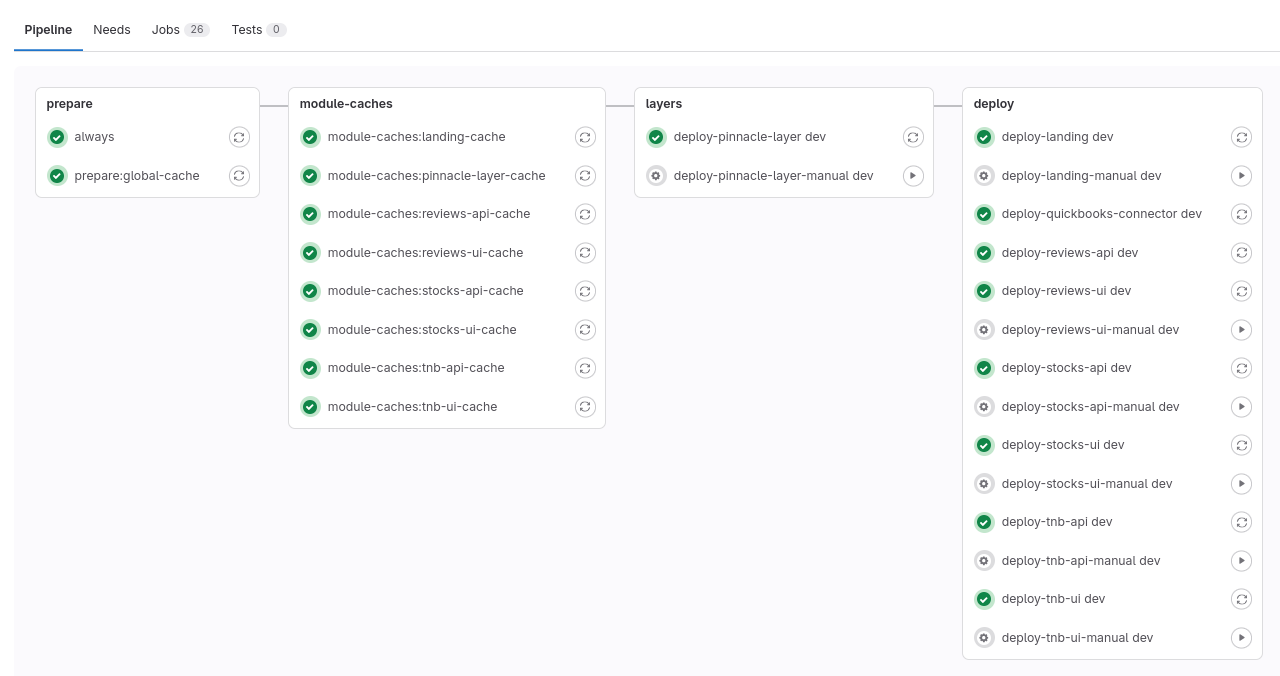So, I recently had the opportunity to extensively dig into Gitlab’s CI/CD. We have a monorepo that I wanted to deploy automatically, and it took quite a bit of work to optimize it and work as I expected.
To set the stage, here’s our core .gitlab-ci.yml file (now):
image: node:18-alpine3.19
variables:
AWS_REGION: us-east-1
AWS_DEFAULT_REGION: us-east-1
FF_USE_FASTZIP: 'true'
ARTIFACT_COMPRESSION_LEVEL: 'fast'
CACHE_COMPRESSION_LEVEL: 'fast'
stages:
- prepare
- module-caches
- layers
- build
- deploy
#******************************************************************
include:
- local: '.gitlab/cache-ci.yml'
- local: '.gitlab/rules-ci.yml'
- local: '.gitlab/build-ci.yml'
- local: '.gitlab/deploy-ci.yml'
- local: 'apps/landing/.gitlab-cache-ci.yml'
- local: 'apps/landing/.gitlab-ci.yml'
- local: 'apps/quickbooks-connector/.gitlab-ci.yml'
- local: 'apps/reviews/reviews-api/.gitlab-cache-ci.yml'
- local: 'apps/reviews/reviews-api/.gitlab-ci.yml'
- local: 'apps/reviews/reviews-ui/.gitlab-cache-ci.yml'
- local: 'apps/reviews/reviews-ui/.gitlab-ci.yml'
- local: 'apps/stocks/stocks-api/.gitlab-cache-ci.yml'
- local: 'apps/stocks/stocks-api/.gitlab-ci.yml'
- local: 'apps/stocks/stocks-ui/.gitlab-cache-ci.yml'
- local: 'apps/stocks/stocks-ui/.gitlab-ci.yml'
- local: 'apps/tnb/tnb-api/.gitlab-cache-ci.yml'
- local: 'apps/tnb/tnb-api/.gitlab-ci.yml'
- local: 'apps/tnb/tnb-ui/.gitlab-cache-ci.yml'
- local: 'apps/tnb/tnb-ui/.gitlab-ci.yml'
- local: 'packages/pinnacle-layer/.gitlab-cache-ci.yml'
- local: 'packages/pinnacle-layer/.gitlab-ci.yml'
# variables:
# CI_DEBUG_TRACE: true
#******************************************************************
always:
stage: prepare
script:
- env | sort
Here are some of the things that drove me crazy:
- Anchors are only valid in the current yaml file
- Don’t use needs – use stages instead
- Caching in Gitlab works great, but you need to specify your cache in right order
- You can only create/use 4 separate caches per job
Here are some details on these to hopefully help you out in the future.
Anchors
Anchors are tremendously useful. If you haven’t used them before, anchors in a yaml file can give you the ability to, in effect, memorize a block of yaml and later in the file, use that yaml without having to cut and paste it. Here is an example:
.yarn-global-cache: &yarn-global-cache
key: $CI_MERGE_REQUEST_SOURCE_BRANCH_NAME$CI_COMMIT_BRANCH-global-cache
paths:
- .yarn/install-state.gz
- .yarn/cache
- node_modules
.push-yarn-global-cache:
cache:
- policy: pull-push
unprotect: true
<<: *yarn-global-cache
.pull-yarn-global-cache:
cache:
- policy: pull
unprotect: true
<<: *yarn-global-cacheSo, as you can see here, I only define my cache paths once, but I can use them in multiple places.
Here’s where I ran afoul of the same-file issue. In the above code, I really wanted to use yarn-global-cache elsewhere in my pipeline. However, since it’s an anchor, its scope is only this local file.
Gitlab has an alternative though, which you can see here. Anywhere I want to use this cache, all i have to do is:
extends:
- .pull-yarn-global-cacheThis will essentially include the same code as above into your current block of code. Seems ideal, right? Well, here’s the rabbit hole I went down:
Our internal applications are a set of websites/microservices that handle our day/day operations like time and billing, expense reports, employee reviews, etc. Each of these we’ve designed to be a static website, talking about microservice for simplicity. All of them are currently written in TypeScript and use the serverless framework as the back-end. I was looking at the six repos that made three applications, each having a front end and a back end, and thought a monorepo would make this so much easier to manage. It did, but that took a lot of pain to get to where it was easy.
When you’re developing a node project, your node_modules folder houses all of the dependencies for your application. In a monorepo, it’s a bit more complex because you have a couple of choices about how you want each project to store its node_modules. What I wanted to do is to leverage some of the newer strategies and use a technique called PNP that yarn and pnpm use. On the one hand, this new mode definitely speeds up the CI/CD process. However, a lot of the tooling for a Node project does not support this. The straw that broke the camel’s back for me was when we started experimenting with Svelte and they categorically said they would never support PNP. At that point, I had to rip out all of that tooling and start from scratch again trying to figure out how to use the traditional node_modules. Thus began the journey into Gitlab caching.
Needs vs Stages
As you will see in the caching section coming next, the dependencies can get complicated when trying to orchestrate a monorepo deployment. I initially thought that I could use the needs construct to specify which job I was waiting for. It seemed easy. Before building the project, specify that it needs its node_modules. Then specify that the node_modules need the global node_modules. For example, I was trying to stage my caches like this:
prepare:global-cache:
extends:
- .push-yarn-global-cache
stage: prepare
script:
- yarn set version 4.1.1 && yarn install --immutable
rules:
- if: $CI_PIPELINE_SOURCE == "push"
changes:
- .yarn/install-state.gz
- yarn.lock
prepare:global-cache2:
extends:
- .push-yarn-global-cache2
stage: prepare
needs:
- prepare:global-cache
script:
- yarn set version 4.1.1 && yarn install --immutable
rules:
- if: $CI_PIPELINE_SOURCE == "push"
changes:
- .yarn/install-state.gz
- yarn.lock
so prepare:global-cache fed into prepare:global-cache2 and then into prepare:global-cache3, etc. However, the minute you use needs, you abandon stages globally and you must use needs everywhere. That wasn’t really ideal.
Instead, use the stages construct. This is what it is really built for anyway. What I broke my project into were the following stages:
prepare– this builds the top-levelnode_modulesand~/.yarn/cachefolders and caches themmodules-cache– this builds in the individual projectnode_modulesfolderslayers– this deploys our lambda layer (speeds up our lambda cold-starts)deploy– this deploys each application
By putting each job in the correct stage, no job will start until the prior stage is finished. For a good visual representation, here’s an example deployment:

Each project requires its node_modules and the global layer to be built first. By using stages, these are sequenced as a group, and the corresponding .gitlab-ci.yaml is simplified.
Caching Done Wrong
First off, the tooling for a node-based project concerning monorepos has come a long way. However, it still has some quirks that are frankly frustrating. After a lot of trial and error, I went back to the classic installation mode where each project has its own node_modules folder. I didn’t want to use this method, but after repeated failures with different tools like ESLint and certain plugins related to that failing, I had no other choice than to go back to the classic installation mode. Hopefully, in the future, this will get better, but for automated deployments, it was the most reliable.
If I simply did a yarn install in the CI/CD pipeline, this would burn up four, five, or even six minutes of our pipeline just to install our node_modules. Even if I cached all of the sources in the .yarn/cache, it still was a significant part of the build process that I wanted to optimize. That left me with the following folders to cache:
./node_modules
./apps/reviews/reviews-api/node_modules
./apps/reviews/reviews-ui/node_modules
./apps/stocks/stocks-api/node_modules
./apps/stocks/stocks-ui/node_modules
...
One of my first routes was using the anchors like this:
.yarn-reviews-api-modules: &yarn-reviews-api-modules
key: $CI_COMMIT_BRANCH-reviews-api
paths:
- .yarn/install-state.gz
- ./apps/reviews/reviews-api/node_modules
.yarn-reviews-ui-modules: &yarn-reviews-ui-modules
key: $CI_COMMIT_BRANCH-reviews-ui
paths:
- .yarn/install-state.gz
- ./apps/reviews/reviews-ui/node_modules
Then I could do one yarn install --immutable and cache things:
.push-yarn-global-cache:
cache:
- policy: pull
unprotect: true
<<: *yarn-global-cache
- policy: pull-push
unprotect: true
<<: *yarn-reviews-api-modules
- policy: pull-push
unprotect: true
<<: *yarn-reviews-ui-modules](<cache:
- policy: pull-push
unprotect: true
%3C<: *yarn-global-cache
- policy: pull-push
unprotect: true
<<: *yarn-tnb-ui-modules
- policy: pull-push
unprotect: true
<<: *yarn-tnb-api-modules
- policy: pull-push
unprotect: true
<<: *yarn-reviews-api-modules
- policy: pull-push
unprotect: true
<<: *yarn-reviews-ui-modules
- policy: pull-push
unprotect: true
<<: *yarn-stocks-api-modules
- policy: pull-push
unprotect: true
<
Then for each sub-project, all I would have to do is:
deploy-reviews-api dev:
extends:
- .vars-reviews-api
- .deploy
- .rule-deploy-dev
- .pull-yarn-reviews-api-modules
And I would be set. Unfortunately, I ran into a couple of problems. First, Gitlab only lets you create four caches during any build. I worked around that by grouping the caches into three stages of four to handle our eleven internal projects, but then I ran into a different problem. The order matters. If I created the cache in this order (this only needs to be done once for each version of yarn.lock):
node_modules push example
global-cachereviews-apireviews-uistocks-apiBut I tried to retrieve them in this order (say when thestocks-apiproject is building):
project build example
global-cachestocks-apiThestocks-apicache would fail, because when I created it, they suffix the cache key with_4(in my push example above). But, in the project build example, it would try to pull with a cache key suffixed with a_1, thereby failing. What a PITA.
Caching Done Right
So, what’s the right solution? What I finally landed on is the following:
The node_modules folder doesn’t change frequently, and it is also typically linked to a branch. So I created a cache for each branch in the monorepo according to a unique branch name + yarn.lock. Then, when the branch is first pushed to Gitlab, each project will build its local node_modules and cache them. As you can see from before, I tried to just do four builds to get my 11 node_modules caches, but for both simplicity and ease of maintenance, I changed to actually do each project’s build independently.
Impact? Some. I went from 4 jobs running per new branch update to 11. However, the simplicity was a big win. Further, by adopting a common pattern for each project, I was able to create a template for each project and automate the cache creation. Here’s how:
- First, I created a template for a given module that would build every project’s
node_modulesin a similar fashion:
cat < $FOLDER/.gitlab-cache-ci.yml
.yarn-global-cache: &yarn-global-cache
key: \$CI_MERGE_REQUEST_SOURCE_BRANCH_NAME\$CI_COMMIT_BRANCH-global-cache
paths:
- .yarn/install-state.gz
- .yarn/cache
- node_modules
.yarn-$MODULE-modules: &yarn-$MODULE-modules
key: \$CI_MERGE_REQUEST_SOURCE_BRANCH_NAME\$CI_COMMIT_BRANCH-$MODULE
paths:
- $FOLDER/node_modules
$MORE_FOLDERS
.pull-yarn-$MODULE-modules:
cache:
- policy: pull
unprotect: true
<<: *yarn-global-cache
- policy: pull
unprotect: true
<<: *yarn-$MODULE-modules
.push-yarn-$MODULE-modules:
cache:
- policy: pull
unprotect: true
<<: *yarn-global-cache
- policy: pull-push
unprotect: true
<<: *yarn-$MODULE-modules
module-caches:$MODULE-cache:
extends:
- .push-yarn-$MODULE-modules
stage: module-caches
script:
- yarn prepare
rules:
- if: \$CI_PIPELINE_SOURCE == "push"
changes:
- .yarn/install-state.gz
- yarn.lock
- .trigger-build
- $FOLDER/.trigger-module-cache-build
EOF
- Each project has its build recipe and its
node_modulesrecipe:
include:
- local: '.gitlab/cache-ci.yml'
- local: '.gitlab/rules-ci.yml'
- local: '.gitlab/build-ci.yml'
- local: '.gitlab/deploy-ci.yml'
- local: 'apps/landing/.gitlab-cache-ci.yml'
- local: 'apps/landing/.gitlab-ci.yml'
- local: 'apps/reviews/reviews-api/.gitlab-cache-ci.yml'
- local: 'apps/reviews/reviews-api/.gitlab-ci.yml'
- Within each build script:
.vars-reviews-api:
variables:
MODULE_NAME: reviews-api
MODULE_PATH: apps/reviews/reviews-api
.deploy-reviews-api:
stage: deploy
script:
- cd $MODULE_PATH
- yarn run deploy-${CI_ENVIRONMENT_SLUG}
build-reviews-api:
extends:
- .build
- .vars-reviews-api
- .rule-merge-request
- .pull-yarn-reviews-api-modules
deploy-reviews-api dev:
extends:
- .vars-reviews-api
- .deploy-reviews-api
- .rule-deploy-dev
- .pull-yarn-reviews-api-modules
deploy-reviews-api prod:
extends:
- .vars-reviews-api
- .deploy-reviews-api
- .rule-deploy-prod
- .pull-yarn-reviews-api-modules
As you can see, this greatly simplified my deployment process by using these extends construct and making the cache templates. This went from something that was very bug-ridden to a repeatable process that is actually fast. A given deployment only takes 1-2 minutes for a code change now because of how well we are caching.

